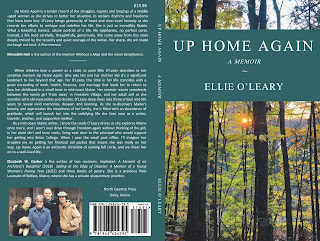Blank Verse
Blank verse and free verse are not the same. Free verse is much freer, but blank verse is almost always free of end-of-line rhymes. Try putting your free verse poem into meter.
Blank verse usually
has ten syllables per line with every other syllable stressed, known as iambic
pentameter, the
most common meter in English verse. The ten syllables are accented on every second beat. There
are five iambs, a metric foot of two syllables with the stress on the second syllable.
These lines in iambic pentameter are the opening lines of “Lines Composed a Few Miles above Tintern
Abbey, On Revisiting the Banks of the Wye during a Tour. July 13, 1798” by William Wordsworth. (This has been one of
my favorite poems since high school.)
The iambic pentameter line is the length of a human breath. I haven’t measured it, but that’s what I’ve been told. Try taking a breath, reading a line, and then taking another breath.
Mending Wall
Something there is that doesn't love a wall,
That sends the frozen-ground-swell under it,
And
spills the upper boulders in the sun;
And makes
gaps even two can pass abreast.
The work of hunters is
another thing:
I have come after them
and made repair
Where they have left not
one stone on a stone,
But they would have the
rabbit out of hiding,
To please the yelping
dogs. The gaps I mean,
No one has seen them made
or heard them made,
But at spring
mending-time we find them there.
I let my neighbor know
beyond the hill;
And on a day we meet to
walk the line
And set the wall between
us once again.
We keep the wall between
us as we go.
To each the boulders that
have fallen to each.
And some are loaves and
some so nearly balls
We have to use a spell to
make them balance:
‘Stay where you are until
our backs are turned!’
We wear our fingers rough
with handling them.
Oh, just another kind of
out-door game,
One on a side. It comes
to little more:
There where it is we do
not need the wall:
He is all pine and I am
apple orchard.
My apple trees will never
get across
And eat the cones under
his pines, I tell him.
He only says, ‘Good
fences make good neighbors.’
Spring is the mischief in
me, and I wonder
If I could put a notion
in his head:
‘Why do they make good
neighbors? Isn't it
Where there are cows? But
here there are no cows.
Before I built a wall I'd
ask to know
What I was walling in or
walling out,
And to whom I was like to
give offense.
Something there is that
doesn't love a wall,
That wants it down.’ I
could say ‘Elves’ to him,
But it's not elves
exactly, and I'd rather
He said it for himself. I
see him there
Bringing a stone grasped
firmly by the top
In each hand, like an
old-stone savage armed.
He moves in darkness as
it seems to me,
Not of woods only and the
shade of trees.
He will not go behind his
father's saying,
And he likes having
thought of it so well
He says again, ‘Good
fences make good neighbors.’
Hint: Don’t try this with Frost’s “Stopping by Woods on a Snowy
Evening”. That’s iambic tetrameter. Only four feet, eight syllables per line.
Whose woods these are I
think I know . . .

A Poet’s Glossary by Edward Hirsch
ReplyDeleteHandbook of Poetic Forms by Ron Padgett
The Making of a Poem: A Norton Anthology of Poetic Forms by Mark Strand and Eavan Boland, eds
Staying Alive: Real Poems for Unreal Times by Neil Astley